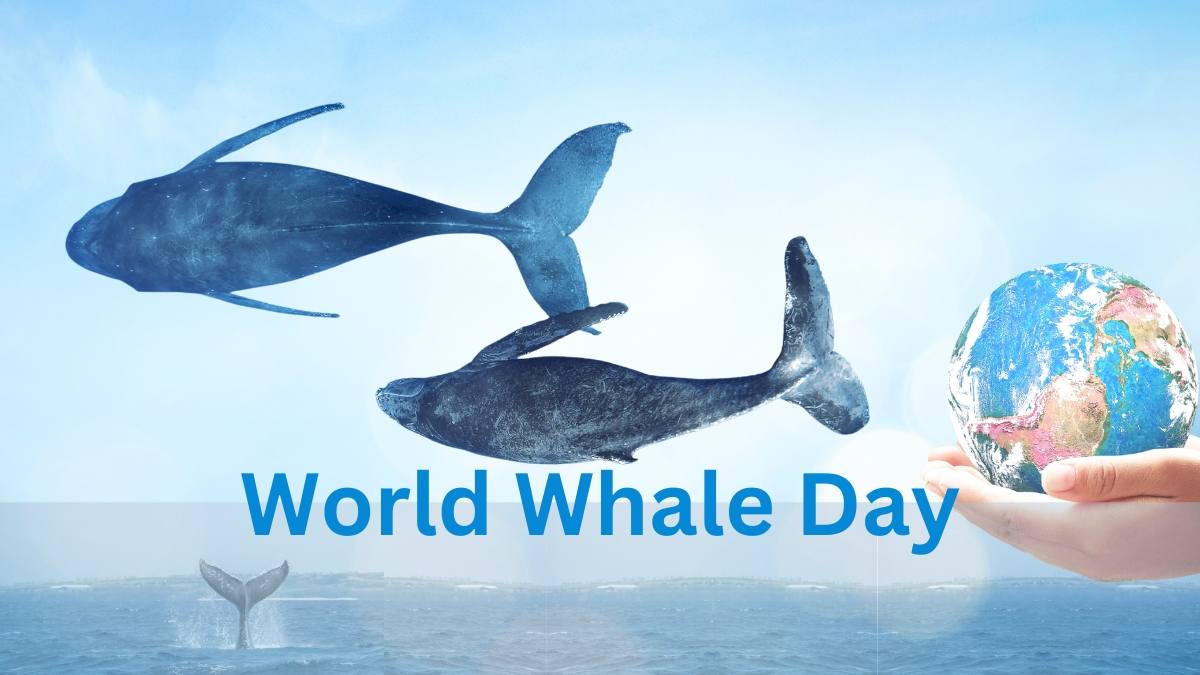Festivals & Events
World Whale Day: History and Significance of the Day

World Whale Day is observed every year on the third Sunday in February; this year it falls on February 18. Today is a day to honor these aquatic animals that play a vital role in the ecosystem. Beyond that, it also highlights the difficulties caused by man-made issues that have surfaced and are making life in the ocean challenging. Climate change, the disposal of waste in our oceans, etc. are the causes of this.
The issues that our oceans around the world face are brought to light on World Whale Day. World Whale Day honors these magnificent marine mammals and is observed on the third Sunday of February each year.
Living in our vast blue oceans are some of the most fascinating creatures. Whales, be they majestic narwhals or massive blue whales, arouse mystery wherever they venture. They have been hunted for their meat and oil for centuries, but they are now threatened by habitat loss and pollution. On World Whale Day, people become more conscious of how urgent it is to save these magnificent and varied whales.
Whales are classified as cetaceans, but they are divided into two suborders: baleen and toothed. Baleen whales have teeth replaced by bristles. The bristles, which are composed of keratin, serve as a filter to gather krill and other tiny marine invertebrates.
Whales do not become the smallest by consuming the smallest food available in the ocean. The largest whale on Earth is the blue whale, a baleen whale that can reach a length of 98 feet. On the other hand, the toothed dwarf sperm whale, which is the smallest whale, can reach a height of 8 feet 10 inches to 6 feet 7 inches.
A unique day to raise awareness of and protect whales is World Whale Day. It’s observed in February to bring attention to the difficulties these amazing animals experience in our oceans.
What is World Whale Day?
Every third Sunday in February is Whale Day, an awareness-raising event for whales and their conservation efforts. Emphasizes the threats posed by human impacts on the oceans and the need for immediate protection. encourages behaviors such as backing laws, boating safely, and choosing sustainably farmed seafood. respects the majesty of these animals and speaks out in favor of their welfare and the health of our oceans.
An international campaign bringing people together to protect whales, their habitats, and the marine ecosystem. On the third Sunday of February, there is a global initiative known as “World Whale Day” to address the threats to whale conservation and whale health posed by human activities in the ocean
World Whale Day History
Some of the most fascinating animals can be found in our vast blue oceans, but they have been hunted for a variety of purposes for centuries. The disappearance of their habitat presents them with yet another difficulty.
In recognition of the humpback whales that formerly swam off the tropical island, World Whale Day was established in Maui, Hawaii, in 1980. Greg Kauffman, the man behind the Pacific Whale Foundation, came up with the concept for this day. His goal was to increase public awareness of the humpback whales’ threat of extinction.
Ever since, the main highlight of the Maui Whale Festival has been the whales. People swarm to this free event to watch a parade featuring floats and characters dressed in costume. Even children’s activities and music by Hawaiian and international celebrities are featured at the festival.
What began as a campaign to increase public awareness of humpback whales in Hawaii has now expanded. Additionally, it aims to raise awareness of the fact that the oceans are not as healthy as they once were. To ensure that whales have a safe place to live, there needs to be a strong call to action.
Whales are incredibly magnificent creatures. The largest whale on Earth is the blue whale, which can reach a length of 98 feet. The toothed dwarf sperm whale, which is the smallest whale, can reach lengths of six feet, seven inches to eight feet, 10 inches.
To protect their natural habitat, we must all recognize this growing concern on this day and take collective action.
World Whale Day Purpose
The main purpose of World Whale Day is as follows:
- Increases awareness of the urgent risks facing a variety of whale species.
- Draws attention to risks brought about by humans, such as pollution, habitat loss, and climate change.
- Advocates for strong ocean conservation laws and sustainable marine practices.
- Informs people about the importance of whales to marine ecosystems and their ecological role.
- Promotes considerate boating and whale-watching methods to reduce disruptions.
- Supports the creation and execution of laws and policies aimed at protecting whales.
- Brings people from all over the world together and cultivates a shared commitment to protecting marine life and its habitats.
World Whale Day Significance
World Whale Day is significant in several ways.
- Increases empathy by bringing attention to endangered whale species.
- Highlights the ecological significance of whales and their impact on marine ecosystems through education.
- Encourages cooperation in the fight against threats brought about by humans, advancing ocean health.
- Encourages admiration for marine biodiversity by presenting the variety of marine life.
- Emphasizes the dependence on one another and the connection between human health and the health of the ocean.
- Promotes responsible behavior and sustainable practices to maintain the balance of the marine ecosystem.
- Gives people the means to participate in international conservation initiatives and encourages a sense of responsibility.
-
Health3 weeks ago
Back to Roots: Ayurveda Offers Natural Cure for Common Hair Woes
-

 Tech4 weeks ago
Tech4 weeks agoFrom Soil to Silicon: The Rise of Agriculture AI and Drone Innovations in 2025
-

 Science1 week ago
Science1 week agoJuly Full Moon 2025: Everything You Should Need to Know, When and Where to See Buck Moon
-

 Sports3 weeks ago
Sports3 weeks agoFIBA 3×3 World Cup 2025: Full Schedule, Preview, and How to Watch
-

 Gadget4 weeks ago
Gadget4 weeks agoThings to Know about Samsung Galaxy S26: What’s New and What’s Next
-

 Tech4 weeks ago
Tech4 weeks agoAdobe Firefly App Now Available on iOS and Android Phones to Create AI Images and Videos Anywhere
-

 Sports2 weeks ago
Sports2 weeks agoPrefontaine Classic 2025: Full Schedule, Preview, Field, Events and How to Watch Diamond League Eugene Live
-

 Festivals & Events4 weeks ago
Festivals & Events4 weeks agoEverything You Should Need to Know about Summer Solstice 2025













